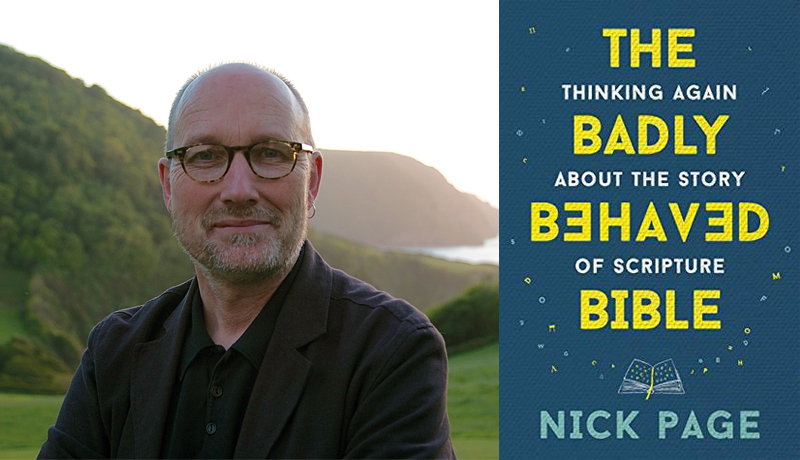“We’ve been told wrong things about the Bible,” he says. “We’ve been misinformed.
“For example,” he continues, “sometimes we’re given the impression that God wrote every word in it, but the Bible is the writing of many people across thousands of years.
“Some other Christians treat the Bible like it is God and end up worshipping it. But the Bible isn’t God—it was written and created by men.”
Bible by Committee
Another problem Nick identifies is that people do not always realize that the Bible is a collection of writings.
“Because it is bound together, some people think the Bible is one book,” he explains. “The fact is, it wasn’t bound together until about 350 AD. Before then, some of it would have been on scrolls and some on codices, early forms of books.
“In a sense, we need to unbind it. Then we would have more awareness that these are different books written by different authors.
“As well as being bound together, it is also translated by committees, which flattens all the voices so that it sounds like it has one author.
“For example, the final book of the Bible, Revelation, was written in extremely bad Greek, by someone for whom Greek was their second language. It’s a very important piece of writing, but it would have been full of grammatical errors. You never find the grammatical errors in the translations, though—it’s always tidied up.”
Encountering God
In an attempt to rectify such misconceptions, Nick has written The Badly Behaved Bible.
“The aim of the book is to come to the Bible and see what it actually is as a text,” he states. “We have to remember that it’s an ancient text, and its writers didn’t have the same categories of writing that we do. We go to it expecting the history parts to be our type of history. But the writers had no concept of writing history as we have.”
Nick makes his point by highlighting the first book of the Bible, Genesis, which has an account of God making the world in six days—something at odds with the scientific evidence of today.
“It doesn’t matter to me whether or not everything in Genesis actually happened,” he disarmingly admits. “Genesis is not a scientific treatise, so expecting it to be is wrong.
“The first two chapters of Genesis contain two different accounts of creation. The people who put Genesis together didn’t see any problem with including two accounts. So I don’t see that they were ever trying to deliver an absolute statement on how the earth was created.
“I see in Genesis primal stories about what it is to be human. Genesis tells us that human beings are made in the image of God. Now, that’s a massive statement, because it means that every human being is precious and unique.
“Genesis also talks about a God who has personal relationships—that’s a constant of the Bible in whatever part we’re reading, and I believe the Bible is a place where we can encounter God and begin a relationship with Him.”
Life-Changing Book
That was certainly Nick’s experience.
“The Bible has had a massive impact on my life,” he says, as he recalls his own conversion.
Having grown up in a Christian home, Nick drifted away from faith as a teenager and found a “different direction.” However, when he started university and felt homesick, he found himself turning to the Bible.
“For some reason, I read John’s Gospel. Previously, my impression of Jesus was of Him being slightly hippy, wandering around Galilee in His nightie, being meek and mild and with a lamb around His shoulders.
“But when I read John’s Gospel, a very different image leapt out at me. It was someone who was challenging, rebellious and passionate. Jesus was someone who was deeply concerned for the poor and the excluded and was deeply against religions that excluded people.
“After reading that, I thought that this was someone I could follow and give my life to. Since then, when I have read the Bible, verses have continued to leap out at me.”
It is because of the positive impact the Bible has had on his life that Nick hopes his book will encourage other people to read it and have their lives changed as a result.
“I talk about the Bible as being a place of encounter, a way in which God communicates with us,” he enthuses.
“I want people to realize that, if they read the Bible, they face the possibility that God may say something to them through its words and that their lives may be changed. I think that’s an exciting way of viewing the Bible, and that’s what is so special about it.”
Major Andrew Stone is the editor of the British War Cry.
Reprinted from The War Cry (England) August 17, 2019.










Comment
On Sunday, August 30, 2020, Raymond Loiseau said:
On Monday, August 24, 2020, Raymont Loiseau said:
Editor: Thanks for your comment. The Salvation Army's first doctrine states: "We believe that the Scriptures of the Old and New Testaments were given by inspiration of God, and that they only constitute the Divine rule of Christian faith and practice." So yes, we believe the Bible is inspired by God. However, "inspired by God" and "biblical inerrancy," as defined by some Christians, are not necessarily the same thing.
Leave a Comment